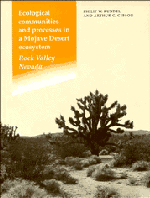Book contents
- Frontmatter
- Contents
- Preface
- Historical prologue on Rock Valley studies
- 1 Introduction to the Mojave Desert
- 2 Physical geography of Rock Valley
- 3 Adaptations of Mojave Desert plants
- 4 Desert perennials of southern Nevada
- 5 Mojave Desert annuals
- 6 Adaptations of Mojave Desert animals
- 7 Mammals
- 8 Reptiles
- 9 Birds
- 10 Arthropods
- 11 Soil organisms and seed reserves
- 12 Nitrogen cycling
- 13 Human impacts on Mojave Desert ecosystems
- References
- Species index
- Main index
7 - Mammals
Published online by Cambridge University Press: 19 October 2009
- Frontmatter
- Contents
- Preface
- Historical prologue on Rock Valley studies
- 1 Introduction to the Mojave Desert
- 2 Physical geography of Rock Valley
- 3 Adaptations of Mojave Desert plants
- 4 Desert perennials of southern Nevada
- 5 Mojave Desert annuals
- 6 Adaptations of Mojave Desert animals
- 7 Mammals
- 8 Reptiles
- 9 Birds
- 10 Arthropods
- 11 Soil organisms and seed reserves
- 12 Nitrogen cycling
- 13 Human impacts on Mojave Desert ecosystems
- References
- Species index
- Main index
Summary
In Mojave desert scrub during the hot daytime mammals are infrequently seen, but at night the desert landscape becomes a very active place when they emerge from their sites of safety to forage (Chapter 6). Chief among these are the small fossorial rodents, particularly Heteromyidae, which constitute a community of several different species and size classes busily harvesting dry fruits and seeds to cache within the burrows. Population densities of heteromyids characteristically show marked seasonal and yearly fluctuations at any site as well as between sites, and density changes have been monitored relatively easily because heteromyid rodents can be efficiently captured and released without injury. Therefore, these rodent communities have been heavily used in studies of patterns and processes in community ecology and population biology (Reichman 1991), particularly at long-term sampling sites, such as in Rock Valley.
MAMMALS OF THE NEVADA TEST SITE
The mammal fauna of the Nevada Test Site consists of 47 species (Allred & Beck 1963; Allred, Beck, & Jorgensen 1963; Jorgensen & Hayward 1963, 1965; O'Farrell & Emery 1976), of which half are rodents (Table 7.1). Many rodent species are members of the families Cricetidae (7 spp.) and Heteromyidae (9 spp.); these groups are common aridland species throughout western North America, including other Mojave Desert areas (Miller & Stebbins 1964). Other mammals occurring on NTS are wideranging species: 4 species of insectivorous bats, 3 species of shrews and 3 of lagomorphs, 7 species of carnivores, and 6 species of large grazers, including occasional wild horses (Equus caballus), domestic cattle (Bos taurus), and wild burros (E. asinus).
- Type
- Chapter
- Information
- Publisher: Cambridge University PressPrint publication year: 1996

